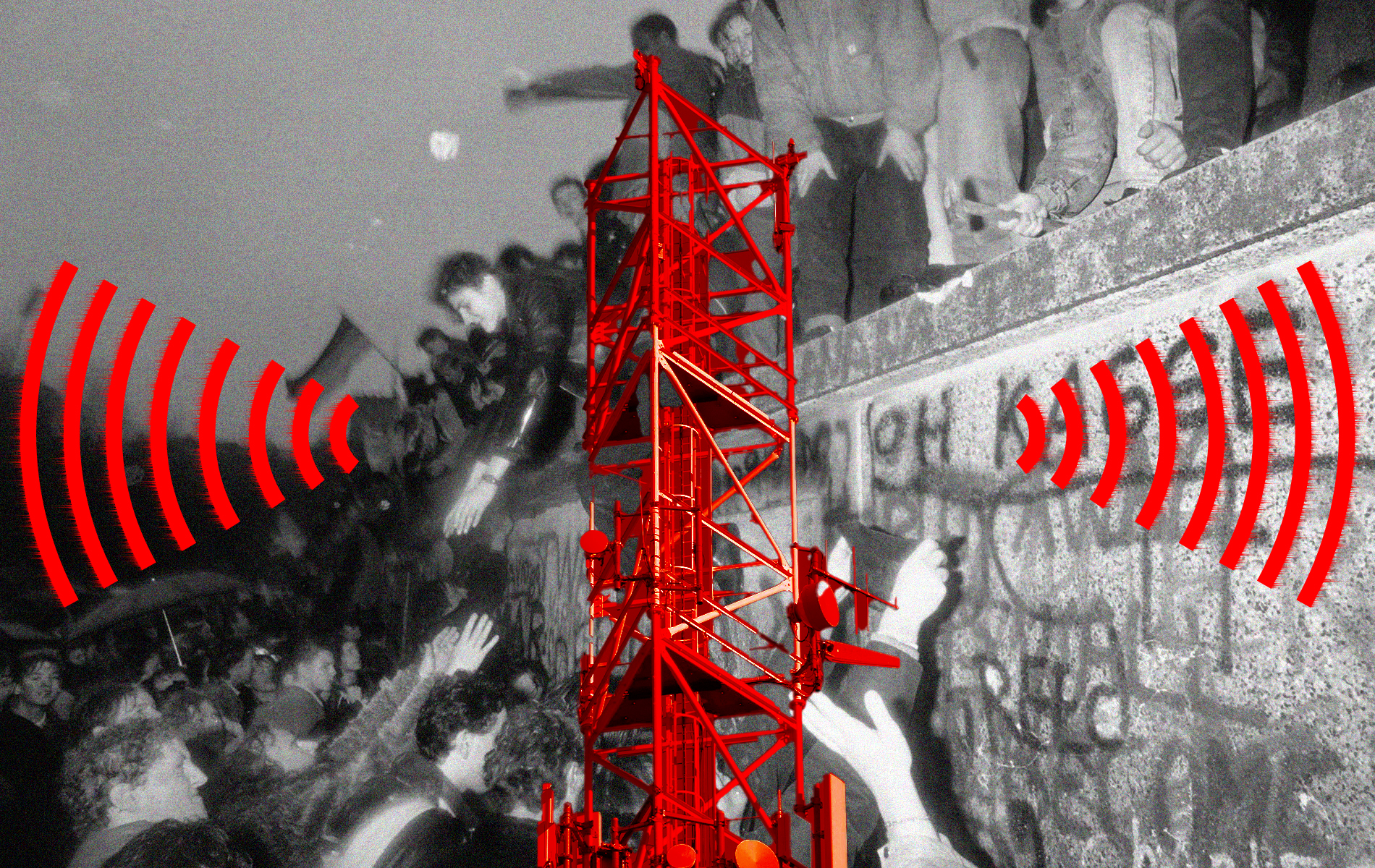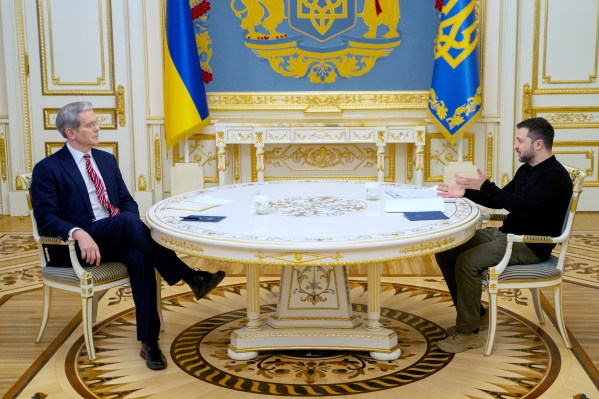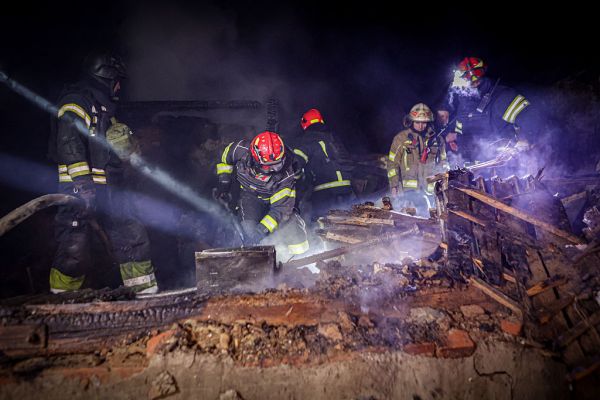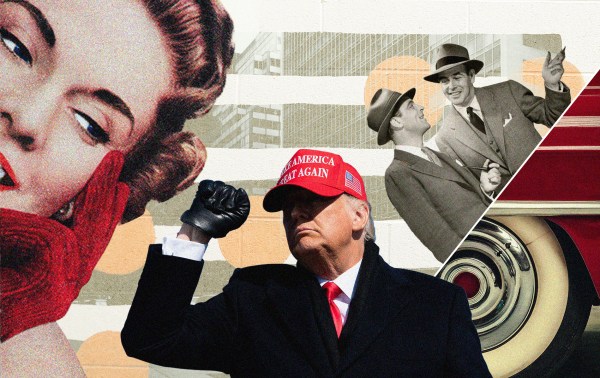In the early years of the twilight struggle against the Soviet Union—as Joseph Stalin solidified control over Central and Eastern Europe—the United States established Radio Free Europe/Radio Liberty (RFE/RL). Its mission: transmit news and analysis beyond the Iron Curtain, with Radio Free Europe broadcasting to the Soviet satellite states and Radio Liberty to the Soviet Union. Staffed mainly by exiles who broadcast in the many languages of a vast expanse stretching from East Berlin to Vladivostok, the “radios,” as they affectionately came to be known, were often the only source of accurate information for tens of millions of people living under what Ronald Reagan correctly called an “evil empire.” The guiding spirit of RFE/RL was symbolized by its original logo, the Liberty Bell, later changed to a light-bearing torch.
Earlier this month, the New York Times reported that RFE/RL has not received its monthly funding of $12 million from the U.S. Agency for Global Media, the government body overseeing it. This is in spite of a federal court order halting President Donald Trump’s earlier plan to shut down the radios along with several other U.S. government-funded broadcasting entities such as the Voice of America and Radio Free Asia. The Trump administration’s ongoing, illegal effort to shutter RFE/RL is not only sabotaging an institution that helped the free world win the Cold War. It’s undermining an intrepid group of people from around the world who are committed to American values and helped make me the journalist I am today.
For the first two decades of its existence, RFE/RL was covertly funded by the Central Intelligence Agency. (Easily one of the best things, along with subsidizing the high-brow anticommunist literary magazine Encounter, the agency has ever done.) Debunking communist propaganda, the pipe-smoking men at Langley presciently understood, would be a cheap and effective way to fight the Cold War without risking it becoming hot.
After RFE/RL’s CIA funding was exposed by Republican Sen. Clifford Chase of New Jersey in 1971, Congress intervened and began funding the radios openly via annual appropriation. Last year, its budget was $142 million. Even if the Trump administration gets around to following the court’s order and disburses these funds, the White House is reserving the right to terminate RFE/RL’s funding “at a later date” if it “were to determine that such termination was appropriate.”
Given the diffuse nature of RFE/RL’s work, the magnitude of its contribution to the collapse of the Soviet Union and the spread of freedom across Central and Eastern Europe is difficult to quantify. An approximation, however, might be deduced from the hostile actions undertaken by the regimes whose legitimacy the radios undermined. From RFE/RL’s very beginning, Eastern Bloc intelligence agencies were constantly trying to infiltrate it with spies, so that they could pilfer information and sow discord among the staff. Communist regimes went to great lengths to jam its broadcasts, and doled out harsh prison sentences to those caught listening to the radios’ forbidden programming. In the 1950s, two Radio Liberty employees were murdered in West Germany, probably by Soviet agents, and the Czechoslovak intelligence service once tried to poison the salt shakers in the RFE/RL cafeteria.
When RFE/RL reported on protests against rising food prices in Poland in 1970, East German state media accused the network of broadcasting “incitements and deliberate directions to adventurers and elements hostile to society.” In 1981, on the orders of Romanian dictator Nicolae Ceausescu, the notorious left-wing terrorist known as “Carlos the Jackal” bombed RFE/RL’s Munich headquarters—his first known American target—causing $2 million worth of damage. “I would … like to thank you for telling the Czech public about me,” the dissident-turned-president of the Czech Republic, Vaclav Havel, told RFE/RL employees in 2001. “If your broadcasts hadn’t covered my plight, I would have remained in prison for a longer time than I did.”

RFE/RL did not rest on its laurels following the West’s victory in the Cold War. As a gesture of his nation’s (as well as his own personal) gratitude, Havel invited the company to relocate its headquarters from Munich to Prague, where, in a fitting rebuke to the country’s erstwhile oppressors, it set up shop in the communist-era parliament building. There, the radios continued to provide comprehensive news and information for the countries in its ambit as they made the transition from dictatorship to democracy. RFE/RL shut down operations in countries once they joined the European Union, and expanded its reach to other nations lacking a free press like Iran, Iraq, and Afghanistan. (In 2020, RFE/RL for the first time relaunched one of its services in an EU member state, Hungary, due to Prime Minister Viktor Orbán’s attacks on independent media). Today, RFE/RL is a full multimedia company broadcasting to 23 countries in 27 languages.
It was this new, evolving, and dynamic RFE/RL that I joined 15 years ago. A belated victim of the 2008 financial crash, I had recently lost my job at a Washington political magazine when the president of the company recruited me to become a writer-at-large based in Prague. My remit was broad: to cover the politics and societies of the countries in RFE/RL’s broadcast region.
What followed was a rollicking adventure—and the fulfillment of a childhood dream to become a foreign correspondent. Barely a week into the job, my boss, a convivial Fleet Street veteran straight from the pages of Scoop, dispatched me to revolutionary Kyrgyzstan. Arriving with a voice recorder, a camera, and a heavy dose of wanderlust, I interviewed the whole gamut of society, up to and including the hastily chosen new president. A few months later, I was sent off to Belgrade to report on a gay pride parade besieged by violent protesters (one of whom punched me in the face), where I got my first taste of pepper spray. Not long after, I found myself in Minsk covering the violent aftermath of a stolen presidential election, fleeing across an icy city square in subzero weather from a passel of president-for-life Aleksander Lukashenko’s heavily armed tactical police. It was the perfect job for a curious and peripatetic young man (if not for his mother back home).
Everywhere I went, the RFE/RL brand was respected if not revered, its valiant legacy and ongoing work having earned it well-deserved authority. Thugs and tyrants of all political stripes have ample reason to loathe it.
One can see this in the stories of the many RFE/RL employees who have sacrificed their freedom in fearless pursuit of the truth. In 2014, the government of Azerbaijan attempted to blackmail and later arrested my former colleague Khadija Ismayilova on trumped-up charges after she published a series of reports detailing the corrupt dealings of that oil-rich country’s kleptocratic ruling family. She spent a year and a half in prison and was slapped with a travel ban upon her release. Another colleague, Alsu Kurmasheva, was arrested by the Russian government in 2023 while visiting her mother and was later convicted in a secret trial for “spreading false information.” A mother of two, she was dispatched to a penal colony and was released after nine months as part of the prisoner exchange that also freed Wall Street Journal reporter Evan Gershkovich. As of this writing, four RFE/RL journalists are languishing in the jails of the regimes they cover.
“If your broadcasts hadn’t covered my plight, I would have remained in prison for a longer time than I did.”
Vaclav Havel
In a February tweet foreshadowing the ransacking of RFE/RL and other American-backed broadcasters, Department of Government Efficiency head Elon Musk claimed that these institutions are chock-full of “radical left crazy people.” While I can’t speak for RFA and VOA, this is a gross mischaracterization of the more than 1,700 RFE/RL employees dispersed across the organization’s Prague headquarters and regional bureaus. Before smearing them as left-wing activists, Musk should meet some of the people with whom I had the honor of working: the Serbian journalist who covered (and survived) the siege of Sarajevo; the groovy Californian whose laid-back vibes masked a Byzantine knowledge of Central Asian languages, cultures, and politics; the colleague who hated communism so much that she faulted my favorite film—the Academy Award-winning The Lives of Others—for being insufficiently anti-communist due to its sympathetic portrayal of a Stasi officer. No radical leftist she.
During my time at RFE/RL, I encountered an eclectic mix of committed journalists ranging from religious conservatives to free-market liberals to Bernie Sanders-style democratic socialists. Whatever their political affiliation, everyone was some flavor of anti-authoritarian. None of them chose to work for the radios because they wanted to advance a partisan political agenda. They did so for the reason any journalist joining the profession should: to tell the truth.
In the same tweet calling for RFE/RL and other U.S. international broadcasters to be “shut down,” Musk argued that “Europe is free now” and “Nobody listens to them anymore.” The majority of the countries in which RFE/RL operates today are not European, and those which are are either outright dictatorships (like Belarus) or emerging democracies that lack a strong, independent media (like the Western Balkans). As to Musk’s claim that “nobody listens” to RFE/RL, 47.4 million people beg to differ.
The institutional knowledge at RFE/RL is incomparable, and I doubt that there is a single American organization—the clandestine one that founded it included—that houses more expertise about the history, culture, and contemporary politics of Eurasia. As for the administration’s claim that the radios are a waste of taxpayer money, they are a rounding error when it comes to annual federal outlays. As the former president who hired me often said, RFE/RL’s annual budget is roughly equal to the cost of two Apache helicopters. That’s a pretty great deal for a storied journalistic institution that reaches tens of millions of people in countries strategically important to America’s national interests.
If the Trump administration fails to comprehend the harm it’s doing by closing down the radios, America’s adversaries do. “This is an awesome decision by Trump!” Margarita Simonyan, editor of the Kremlin-funded RT network, exclaimed after the administration’s initial announcement that it was closing the radios. “We couldn’t shut them down, unfortunately, but America did so itself.” (Given my personal history with this particular lie factory and its sycophantic leader, the expression of schadenfreude was especially grating.) An anonymous Kremlin official quoted by the Moscow Times was less subtle, describing Trump’s actions as “a dog’s death for a dog.” During the Cold War, conservatives rightly blasted the nuclear freeze movement as dangerously naive for demanding unilateral American disarmament in its confrontation with the Soviet Union. Today, many of them echo our adversaries and applaud a pointless act of self-inflicted harm.
In the great war of ideas that shaped the latter half of the 20th century, RFE/RL played an unheralded role in the victory of freedom over tyranny. It brought light to some of the world’s darkest corners, and in so doing, changed it for the better. Today, in another battle between the forces of democracy and dictatorship, the radios continue their valiant mission. If RFE/RL’s stay of execution expires—if the Trump administration succeeds in its goal of shutting the radios down—millions of people living in closed societies will be deprived of a vital resource. If the radios go silent, the voices of despotism, sectarianism, national chauvinism, and other illiberal ideologies will take their place.








Please note that we at The Dispatch hold ourselves, our work, and our commenters to a higher standard than other places on the internet. We welcome comments that foster genuine debate or discussion—including comments critical of us or our work—but responses that include ad hominem attacks on fellow Dispatch members or are intended to stoke fear and anger may be moderated.
With your membership, you only have the ability to comment on The Morning Dispatch articles. Consider upgrading to join the conversation everywhere.